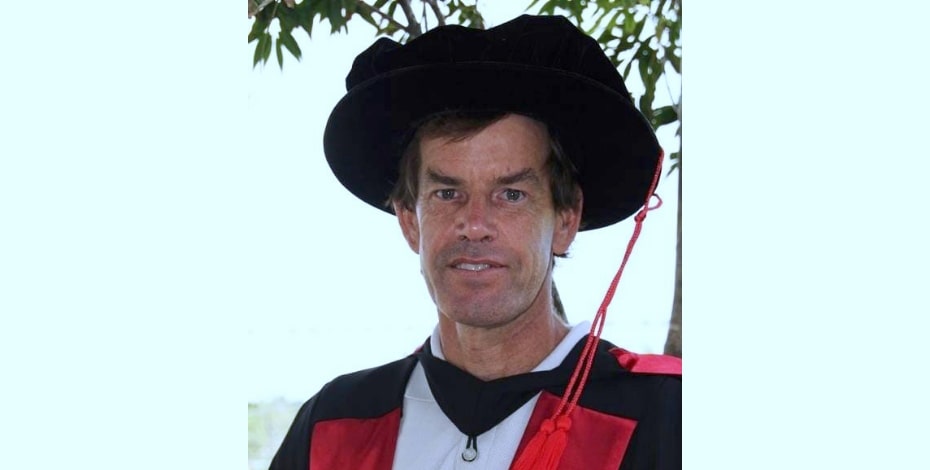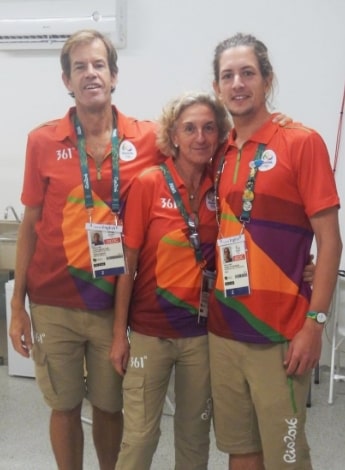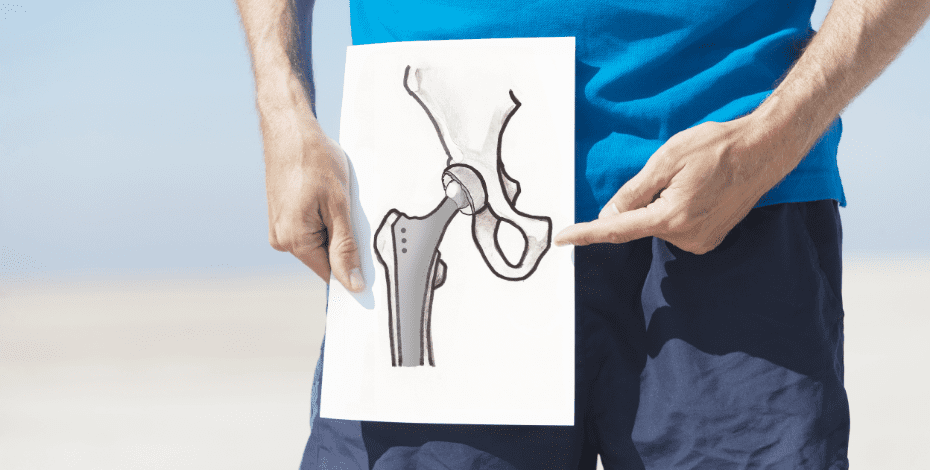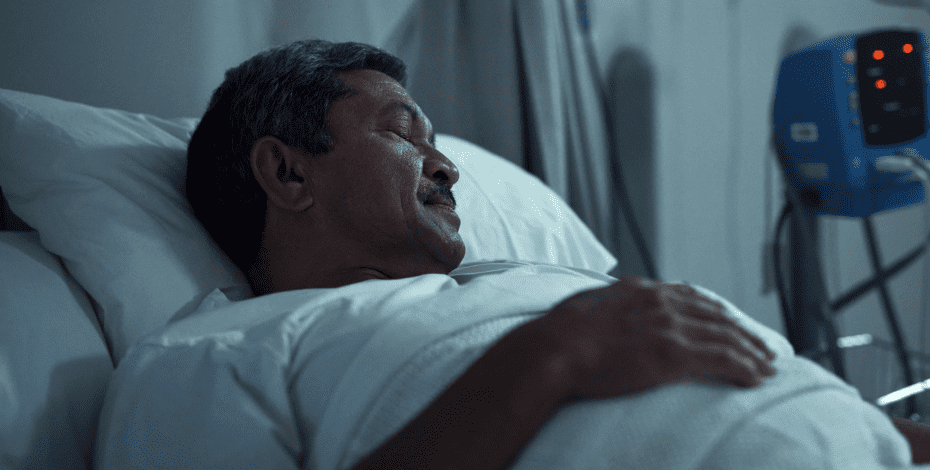
Passionate physio leaves lasting legacy

A dedicated and driven physiotherapist and an avid sportsperson, Phil Gabel leaves behind a legacy that will continue to influence the physiotherapy profession for generations to come.
(Charles) Philip Gabel, 1962–2024
Up until his sudden death in January this year at the age of 61, Dr Phil Gabel MACP was eagerly and enthusiastically
discussing his research and life goals with all of those lucky enough to be around him.
One of Phil’s sons was due to marry in the Caribbean this month, Phil was actively planning to travel to Paris in July for the Olympic Games and he was discussing with colleagues the prospect of pulling together his research work on slacklining into a second PhD.
Often described as a high-energy man with a big heart who was warm, kind and intensely interested in a myriad of subjects, Phil was husband to French cyclist and triathlete Cathy and father to two sons, Mat and Rox.
Professionally, Phil was an APA Sports and Exercise Physiotherapist, a researcher in algorithm-driven digital outcome measures for musculoskeletal conditions, a course convenor, a private practitioner and a prolific author.
He was well known in Australian sporting circles for his work in Australian triathlon and as a treating physiotherapist for the London and Rio Olympics in 2012 and 2016 respectively, and for the Melbourne and Gold Coast Commonwealth Games in 2006 and 2018.
‘Phil was the sort of person who would get up to have a bike ride and a swim, then run to his practice, towel off quickly, put on a fresh shirt and see his first patient,’ says Professor Heather Malcolm MACP, a lifelong friend and physiotherapy colleague.
‘He was incredibly fit and a very successful professional triathlete.
'Phil met his wife Cathy when he was racing in Europe.
'I was mixed up in triathlon administration as well so I would often be at NT-based triathlons helping with the race organising and time keeping as well as keeping an eye on their kids while they both raced.’
Born and raised in Darwin, Phil met Heather when the pair attended the South Australian Institute of Technology (now the University of South Australia) in 1982.
They formed a group of country physiotherapy student friends living in the residential college, who all studied and socialised together before graduating in 1985.
Phil moved back to Darwin and opened his first private practice and a few years later opened a second practice, which he asked Heather to run for him.
The practice, Arafura Physiotherapy, was subsequently awarded an Australian Defence Force contract to work with the first troops relocated to Robertson Barracks from New South Wales.
Phil completed his PhD through the University of the Sunshine Coast, investigating the link between biopsychosocial screening outcome measures and recovery prediction.
He also held a research master’s degree on upper limb outcome measures and right up until the time of his passing was continuing his research on slacklining as a rehabilitation modality and the interrelationship between stability and movement, differential torsion and loading.
An APA member since 1983, Phil was also a regular face at the annual APA conferences, events where he often workshopped
his ideas with colleagues and friends.
‘Phil was someone who never missed a conference,’ Heather says.
‘I saw him at the APA conference in October 2023 held in Brisbane.
'We were talking about his work on slacklining, which he was considering pulling together into a second PhD.’

Phil Gabel with his wife Cathy and son Mat at the Rio Olympics in 2016.
It was at the Commonwealth Games in Melbourne that he met Dr Peter Selvaratnam FACP, a Specialist Musculoskeletal Physiotherapist (as awarded by the Australian College of Physiotherapists in 2007).
‘Over those two weeks I witnessed his clinical approach to the assessment, treatment and management of athletes,’ Peter says.
‘He had a great camaraderie with athletes.
'Phil’s clinical expertise and academic acumen led me to ask him to write a chapter on dry needling, acupuncture and laser for a multidisciplinary book on headache, orofacial pain and bruxism.
'Phil’s drafts were well accepted by the medical review team. His chapter is still used for pre-reading in dry needling courses for physiotherapists and dentists.
‘Our collegial friendship continued at APA conferences, where he presented on his research on outcome measures.
'He discussed variations in the existing outcome measures and forged ways to enlighten colleagues,’ Peter says.
Similarly, colleague and friend Dr Doug Cary FACP met Phil at an APA conference in 2011 and was immediately struck by his warmth, candid manner, high energy and strong interest in all things.
The two quickly formed a friendship and later, on returning to Queensland, Phil assisted Doug with his dry needling and anatomy courses.
‘I was introduced to two of his many passions—risk screening/outcome measures and slacklining,’ Doug wrote in an online dedication to Phil’s memory in February.
‘Phil was a pioneer in both areas, developing and testing new clinical and research measures and educating health professionals about the benefits of incorporating slacklining into rehabilitation programs, be they musculoskeletal, neurological or respiratory focused.
'He created and collated a large body of important information on both topics, from which our profession will continue to benefit long into the future.
‘Phil’s network of friends and colleagues around the world was testament to his broad areas of interest in research collaborations, travel, sport and adventure and his multilingual capabilities.
'In 2019 we organised a week-long musculoskeletal symposium in the Maldives, on an island that had its own private wave.
'Phil was always looking at things from multiple angles and surfing was another of his passions. So why not combine academia with good food and recreation? Typical Phil.’
Friend and colleague Dr Liisa Laakso MACP says, ‘Phil never let his enthusiasm waver for asking clinical questions and doing
the research to find the answers.
'In many communications with him over the years, he sought and was still seeking ways in which his incredible body of publications might be acknowledged, either through a PhD by publication or by the Australian College of Physiotherapists.
'What a travesty that these ideas were not possible or that time ran out to make them happen.
'His work on slacklining and his PhD work on (and software for) measurement of functional outcomes should be a lasting legacy.
'Up until Christmas he was still writing to me about his ideas.’
Vale Phil Gabel.
© Copyright 2024 by Australian Physiotherapy Association. All rights reserved.





